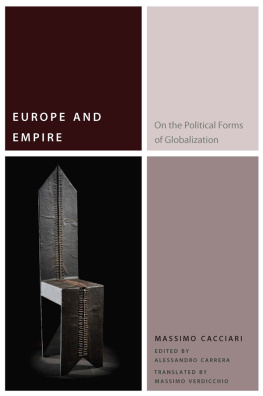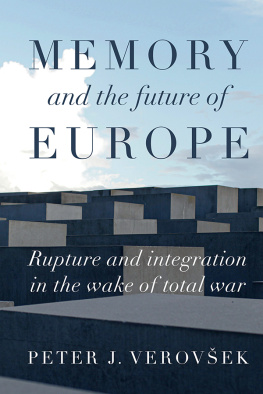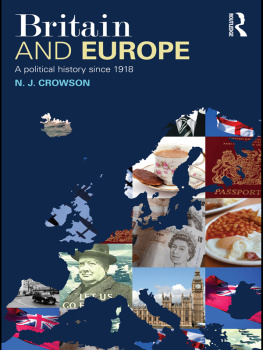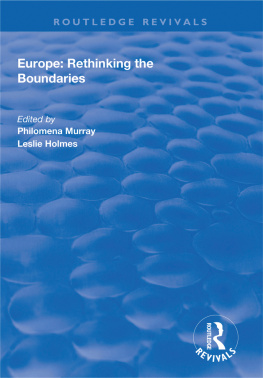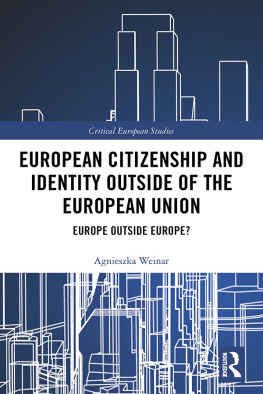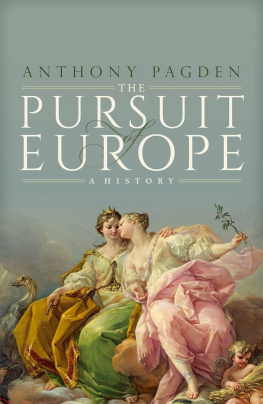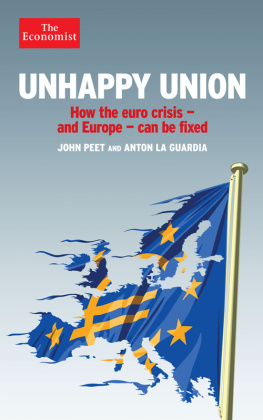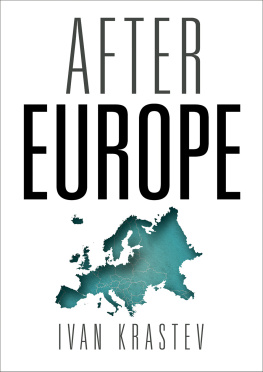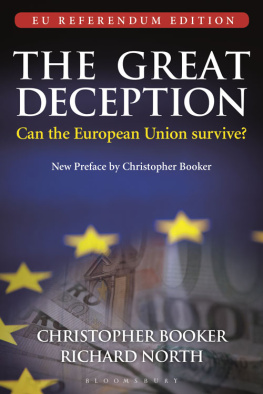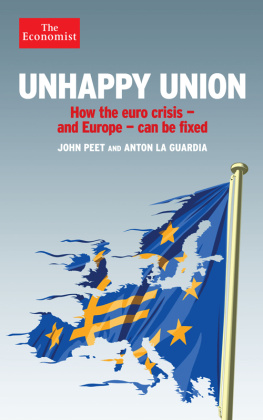EUROPE AND EMPIRE
COMMONALITIES
Timothy C. Campbell, series editor
The editor wishes to acknowledge the financial support of the Grant-in-Aid Program of the University of Houston in the publication of this book.
Copyright 2016 Fordham University Press
All rights reserved. No part of this publication may be reproduced, stored in a retrieval system, or transmitted in any form or by any meanselectronic, mechanical, photocopy, recording, or any otherexcept for brief quotations in printed reviews, without the prior permission of the publisher.
The translation of this work has been funded by SEPS
S EGRETARIATO E UROPEO PER LE P UBBLICAZIONI S CIENTIFICHE
Via Val dAposa 7 - 40123 Bologna - Italy
seps@seps.it - www.seps.it
Fordham University Press has no responsibility for the persistence or accuracy of URLs for external or third-party Internet websites referred to in this publication and does not guarantee that any content on such websites is, or will remain, accurate or appropriate.
Fordham University Press also publishes its books in a variety of electronic formats. Some content that appears in print may not be available in electronic books.
Visit us online at www.fordhampress.com.
Library of Congress Cataloging-in-Publication Data
Names: Cacciari, Massimo, author.|Carrera, Alessandro, 1954 editor.|Verdicchio, Massimo, 1945 translator.
Title: Europe and empire : on the political forms of globalization / Massimo Cacciari ; edited by Alessandro Carrera ; translated by Massimo Verdicchio.
Description: First edition.|New York : Fordham University Press, [2016]|Series: Commonalities|Includes bibliographical references and index.
Identifiers: LCCN 2015017375|ISBN 9780823267163 (hardback)|ISBN 9780823267170 (paper)
Subjects: LCSH: European federation.|EuropePolitics and government.|GlobalizationEurope.|European cooperation.|EuropeEthnic relations.|Religion and stateEurope.|BISAC: POLITICAL SCIENCE / History & Theory.|POLITICAL SCIENCE / Civics & Citizenship.
Classification: LCC D1060 .C223 2016|DDC 327.4dc23
LC record available at http://lccn.loc.gov/2015017375
Printed in the United States of America
18 17 16 5 4 3 2 1
First edition
CONTENTS
Introduction: Massimo Cacciaris Genealogy of Europe
Alessandro Carrera
With the exception of the recent chapter on the katechon , I have written the essays collected in this volume in years when, at least to me, it looked like Europe was getting close to embracing a political and cultural constitution that would have made the European voice heard in the initial stage of the global era, after the fall of the Berlin Wall and the end of Third World War. To me and many others it appeared that the construction of European political unity, no matter the different accents and perspectives involved, ought to be guided by an idea and not just by unstoppable, market-driven necessities. It seemed that the twilight of hegemonic will to power, which had been the constant trait of European history, could signal a new beginning in the wake of great traditions, undoubtedly, for every true innovation is also a reformation. My attention to the idea of empire as opposed to monarchy or, worse, tyranny stemmed from a reconsideration of some key categories of Roman law, especially the concepts of republic ( res publica ) and city ( civitas ), which were the soul of the Roman system. I can say the same for my attention to the idea of a universal public authority ( publica auctoritas universalis ), today often invoked every time the economic and financial globalization, unable to follow any rule except the market law ( lex mercatoria ), unleashes a new catastrophic crisis.
An idea of Europe as a real, strong political organism made of nations ( ex nationibus ), founded on the lasting value of their languages and traditions, at the twilight of European will to powerthat was the new beginning I was trying to read . Considering the possibility of a new start, I set out to discern a paradigm of international relations among the great areas of the planet. It was an idea of empire as the expression of a groundbreaking pact ( foedus ) among free subjects that would understand the pacts necessity and on this realistic basis be willing to turn it into a destiny . It was an idea of empire as a relation among autonomous realities. In other words, an idea of Europe as a political and cultural space in between . Because being-in-between ( Zwischen-sein ) has always been the essence of Europe: an unending translation between East and the West, Mediterranean and Romnia, Romnia and Germania (Tacitus!). This destination is the only value that a united Europe ought to present to the globalized world: a political entity capable of self-translation, confident among people who are truly Other, and that finds its own identity in the act of taking care of them.
History has replied harshly to all these ideas. In the last decade, after the dream of the European Constitution failedmostly on the account of the staggering cultural and political weakness of those who were supposed to build its framethe European Union, pushed by the great economic crisis, has exalted its technocratic-financial side while remaining conspicuously absent in all the tragedies of the recent years. (In fact, when the European Union was present, it just followed other actors, often making things worse.) Entirely oblivious to the events unfolding on the other shore, Europe tolerated that the Mediterranean, her sea, would turn into a graveyard . As the recent elections of the European Parliament have clearly shown, the collapse of solidarity and hospitality that has tarnished Europes image may now be irreversible, and it also threatens the entire fabric of the union.
In the end, it seems that no resurrection will follow the demise of European political and military power, sanctioned by two suicidal world wars. The end of Europe as the political center of the world will find its conclusion in the end of Europe as a cultural and religious center (recent events in Christianity seems to point in that direction). Yet, which other history can provide the fundamental principles of a dialogue among peoples and cultures, a dialogue free from the obsession of reducing everything to One ( reductio ad unum )? Where else can we look for a res publica in which political participation wields true power ( potestas ) and is not limited to electoral representation? Again, which history should we look to if we dont want to restrict the political to the supposed laws of economy and finance, their supposed mechanisms and automatisms, and if we dont want to hand it over, in the end, to the dire consequences that the primacy of those laws has produced and produces? The political unity of Europe is still a necessity, even though it is less and less likely to happen.
LEuropa di Mara Zambrano. Paradosso. Quadrimestrale di filosofia 3, no. 8 (1994): 173178.
Il mito della civitas augescens . Il Veltro. Rivista della civilt italiana 41, nos. 24 (1997): 161168.
Pensare lEuropa. MicroMega 4 (1999): 199207.
Europa o Cristianit. In Dopo 2000 anni di Cristianesimo , ed. Servizio Nazionale della Conferenza Episcopale Italiana per il Progetto Culturale, 103132. Milan: Mondadori, 1999.

